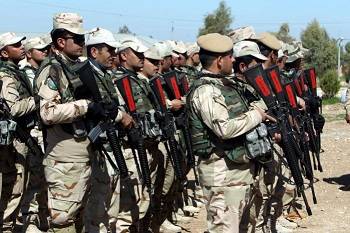Iraqi Kurdish forces have unlawfully destroyed Arab homes and villages in northern Iraq over the past two years in what may amount to a war crime, rights group Human Rights Watch (HRW) said on Sunday.
Kurdish Peshmerga fighters are part of a 100,000-strong Iraqi alliance, helped by US-led air raids and military advisers, that is battling to retake Mosul from Islamic State in Iraq and the Levant (ISIL).
The New York-based rights group said in a report that violations between September 2014 and May 2016 in 21 towns and villages in disputed parts of the Kirkuk and Nineveh provinces had followed "a pattern of apparently unlawful demolitions".
The areas are nominally under the jurisdiction of Baghdad but are de facto controlled by the Kurdistan Regional Government (KRG), which pushed ISIL (also known as ISIS) from swathes of northern Iraq it seized in 2014. The KRG has since accepted more than 1 million refugees - mostly Sunni Arabs - fleeing the fighting.
A KRG spokesman was not immediately available to comment on the report.
HRW said the report was based on more than a dozen field visits and interviews with over 120 witnesses and officials. Analysis of satellite images suggests property destruction targeted Arab residents long after any military necessity for such actions had ended, it said.
"In village after village in Kirkuk and Nineveh, KRG security forces destroyed Arab homes - but not those belonging to Kurds - for no legitimate military purpose," Joe Stork, deputy Middle East director at HRW, said.
"KRG leaders' political goals don't justify demolishing homes illegally."
HRW said the satellite imagery showed destruction in 62 other villages after their capture by Kurdish security forces, but that a lack of witness accounts made it difficult to determine cause and responsibility in those cases.
Kurdish officials have stated their intention to absorb land recovered from ISIL into their autonomous region and prevent Arab residents from returning to areas "Arabized" decades ago by Saddam Hussein.
"These areas that the Peshmerga have captured are part of Federal Iraq and numerous Kurdish officials, from Marsoud Barzani all the way down, have voiced their intent on integrating into Iraqi Kurdistan," Patrick Martin, lead Iraq researcher at the Institute for the Study of War, told Al Jazeera.
"It’s effectively created an ethnic fault line between the Peshmerga and the federal government. At some point after the recapture of Mosul, and probably before then and definitely afterwards, there’s going to be a very serious debate between Iraqi Kurdistan and Baghdad of who actually has control over these areas and the return of Sunni Arab IDPs to their homes in the Peshmerga-held areas. This has the potential to be a very serious flashpoint that could degenerate into violence."
KRG and Peshmerga say their forces often need to destroy homes because ISIL rigs them with explosives before it retreats.
But demining experts who spoke to HRW said the demolitions were "inconsistent with accepted practices and that uncontrolled explosions risked dispersing explosives throughout rubble, making the area and later cleanup extremely unsafe."
In some cases, the destruction of homes and villages took place weeks and months after Kurdish forces retook control of the areas, "indicating that eliminating ISIS-planted explosive devices was not essential to KRG military operations and did not meet the test under international humanitarian law of imperative necessity as a justification for attacks on civilian objects," HRW said.
In other instances, according to the report, Peshmerga demolished buildings in villages that ISIL never controlled. In some of those cases, KRG officials said their forces destroyed homes because one or more of the inhabitants supported ISIL.
Last month, the London-based rights group Amnesty international released a report accusing Kurdish forces of destroying Arab homes and forcing Arab residents out of the ethnically mixed city of Kirkuk, which is under the de facto control of Kurdish forces.
PHOTO CAPTION
Kurdish Peshmerga fighters take part during a training session by coalition forces in a training camp in Erbil, north of Iraq, March 9, 2016. REUTERS
Al-Jazeera


 Home
Home Discover Islam
Discover Islam Quran Recitations
Quran Recitations Lectures
Lectures
 Fatwa
Fatwa Articles
Articles Fiqh
Fiqh E-Books
E-Books Boys & Girls
Boys & Girls  Ramadan
Ramadan Fatwa Audios
Fatwa Audios Month of Mercy
Month of Mercy Women
Women Eed Al- Fitr
Eed Al- Fitr Food Recipes
Food Recipes Videos
Videos

 Prayer Times
Prayer Times












